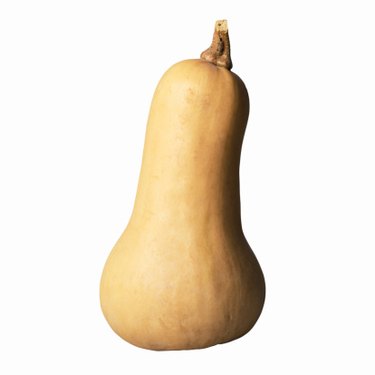
Butternut squash is a thick-skinned winter squash that stores well, making it a perfect addition to your cold-weather, vegetable reserves. Grate raw squash on top of salad as a colorful garnish. Puree to make hearty soups and sauces. Or boil and bake to make a delicious side dish. Butternut squash is naturally fat-free, high in fiber and chock full of vitamins A and C. A half cup of baked squash only has 40 calories, so enjoy it guilt-free.
Plant in April
Video of the Day
Butternut squash is a vegetable that matures during the warm summer months. Plant squash in late May or April after the threat of the last frost has passed. If you live near Miami or Coral Gables, where there is no frost, you can plant squash as soon as the average ground temperature reaches 15 degrees Fahrenheit.
Video of the Day
Placement
Squash is an annual so it must be replanted every year. Change the location of your butternut every two years to replenish the nutrients in your soil. Plant one or two seeds 3 feet apart. Cover seeds with no more than 1 inch of soil and moisten. Seedlings will appear in approximately two weeks.
Harvesting
It takes 75 to 100 days for butternut squash to fully mature. To select a ripe squash, attempt to puncture the skin with your thumbnail near the base. If the skin does not break, the squash is ripe. Check the crop daily. Harvest squash when they are small for the best flavor. To remove from bush, cut the vegetable stem with a sharp knife. Be careful not to grasp the leaves or vines when cutting as these plants can develop prickly growths.
Storage
If you plan to use your squash right away, you may store it at room temperature on a counter or in a well-ventilated basket. If storing multiple squash in a single basket, trim stems to 1-inch lengths. This will prevent the woody material from puncturing nearby butternuts. Squash will remain usable for one to two weeks in this state. Butternuts may also be refrigerated, pickled, frozen and vacuum sealed.
- Centers for Disease Control and Prevention: Fruits & Vegetables of the Month: Winter Squash
- U.S. National Arboretum; Plant Hardiness Zone Map; Henry M. Cathey; 2003
- Victory Seeds: Average First and Last Frost Dates for Florida
- University of Arkansas Division of Agriculture; Butternut Squash - Plant of the Week; Gerald Klingaman; 2005
- University of Illinois; Harvesting and Storing...; Maurice Ogutu; 2004